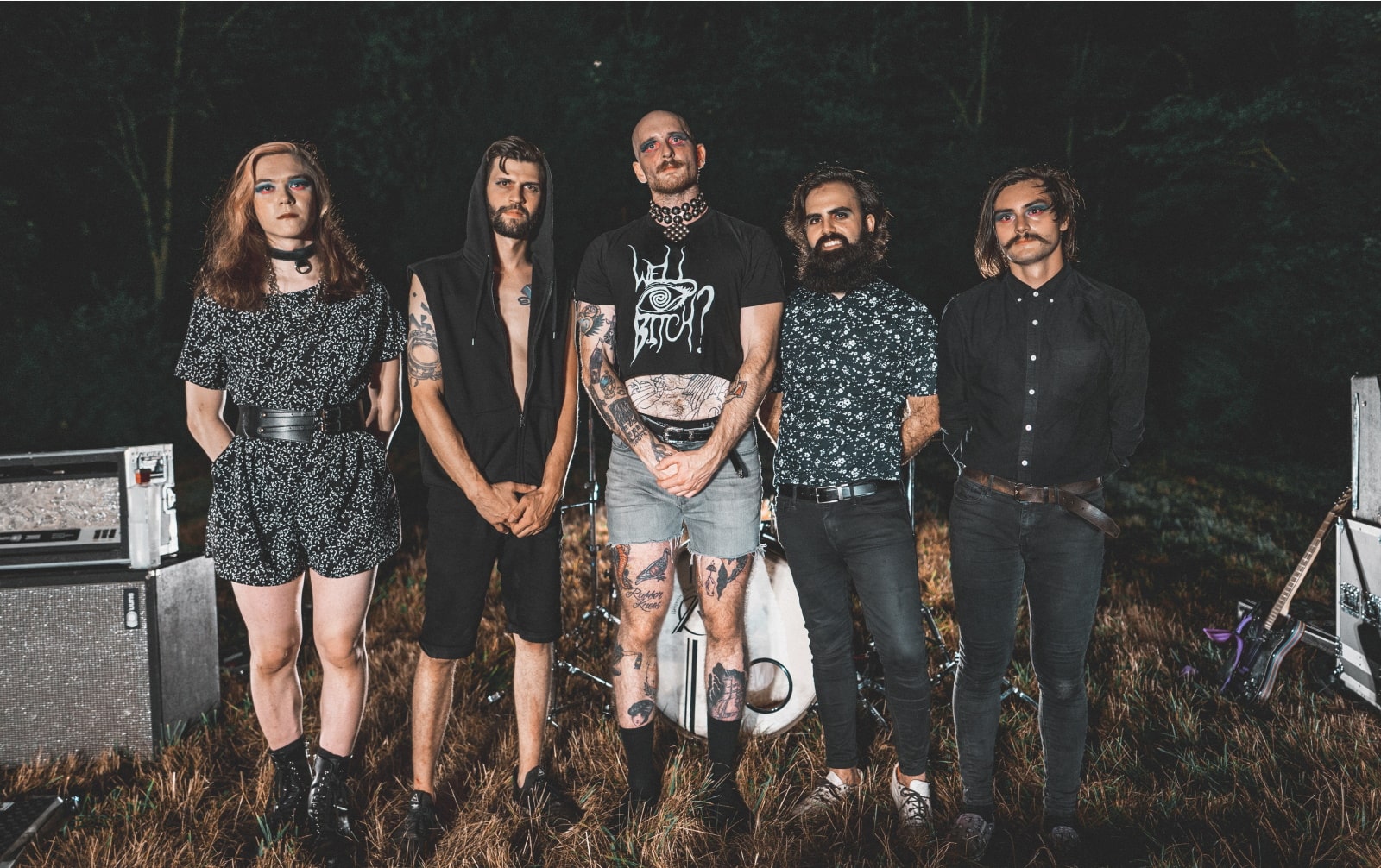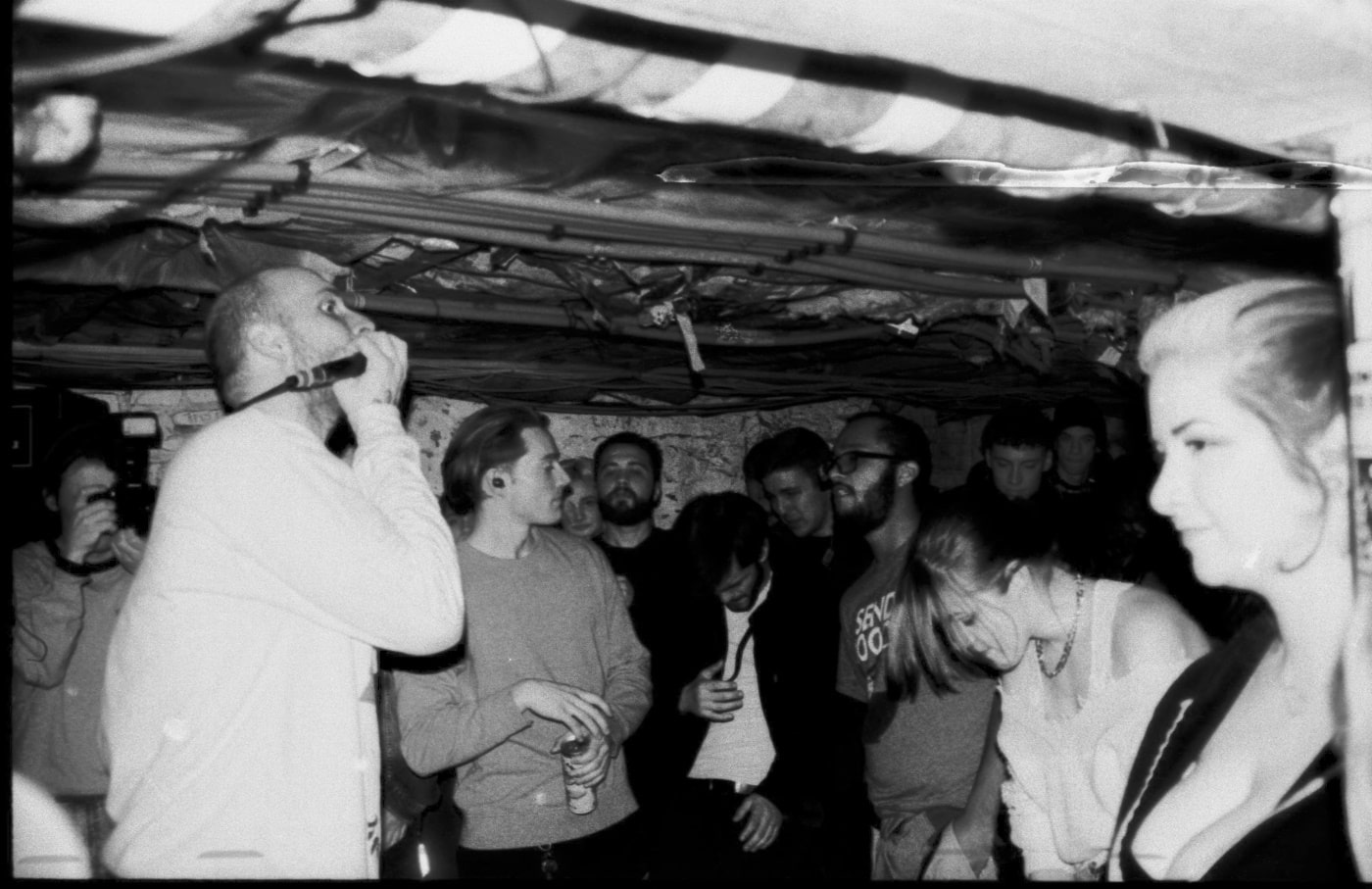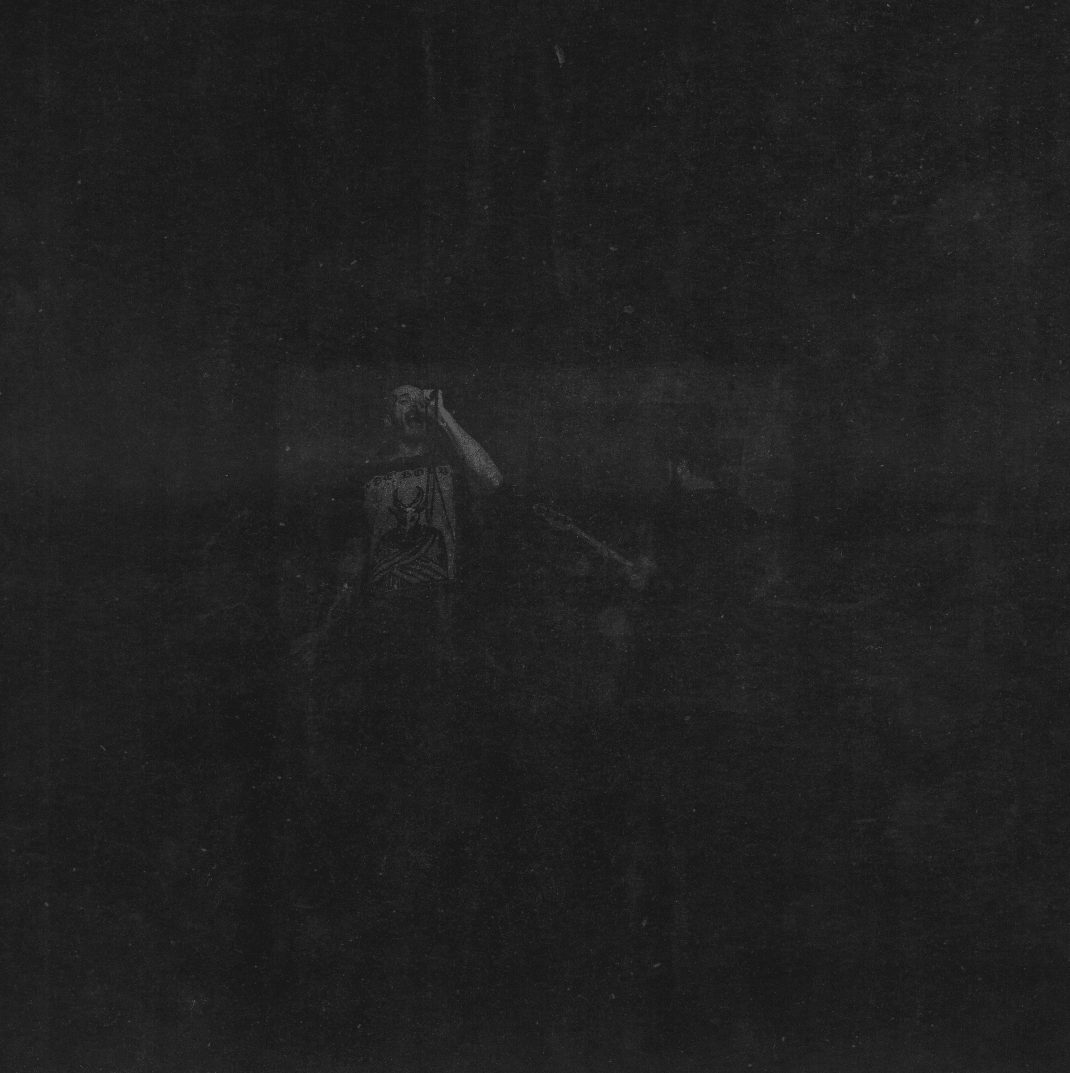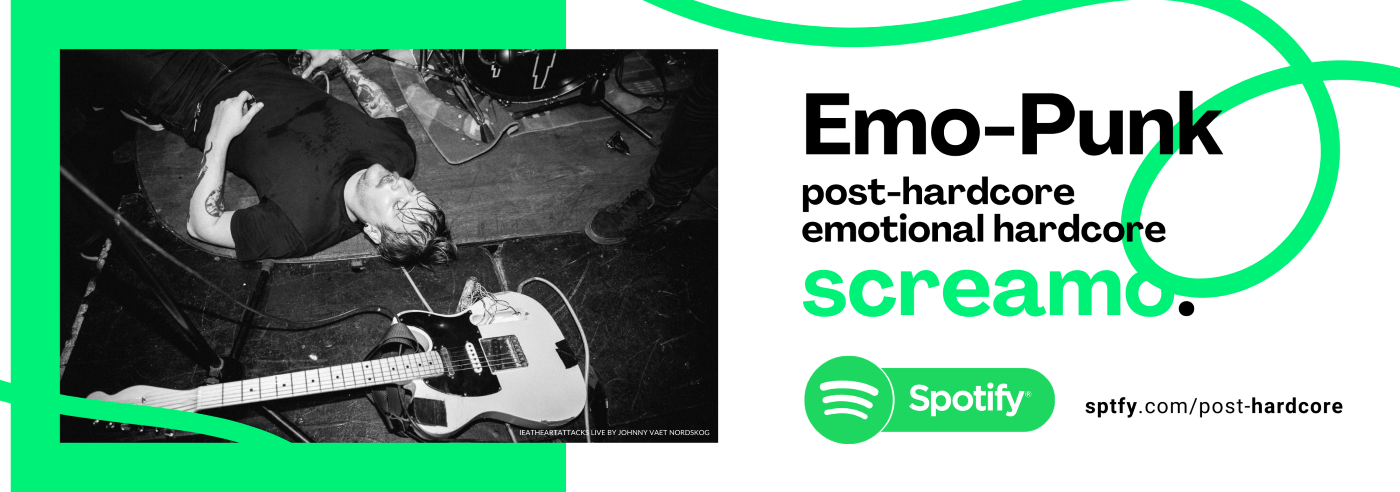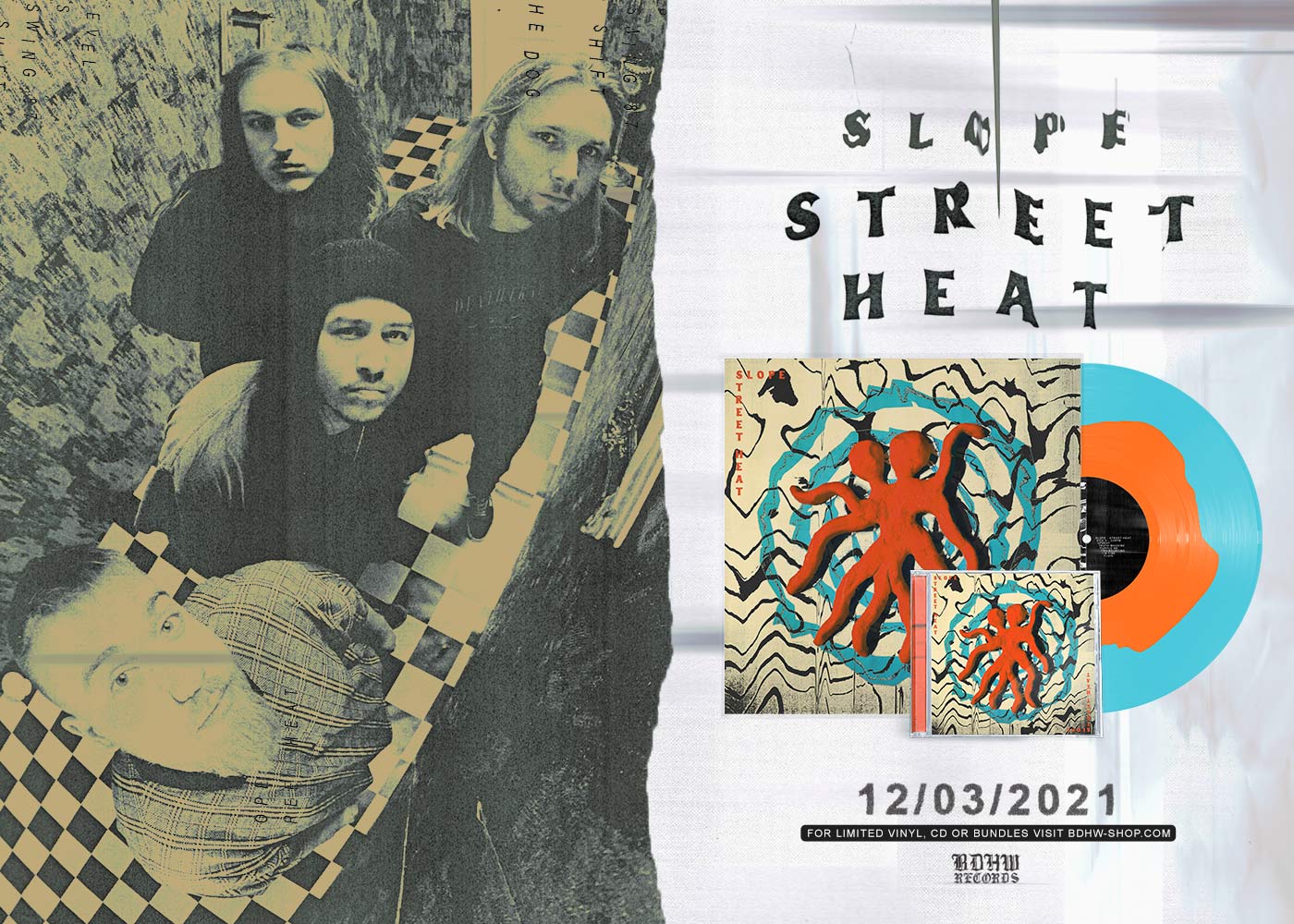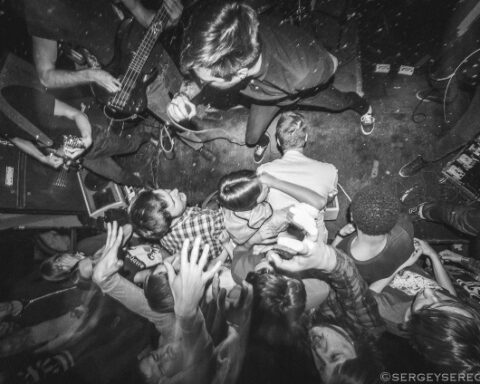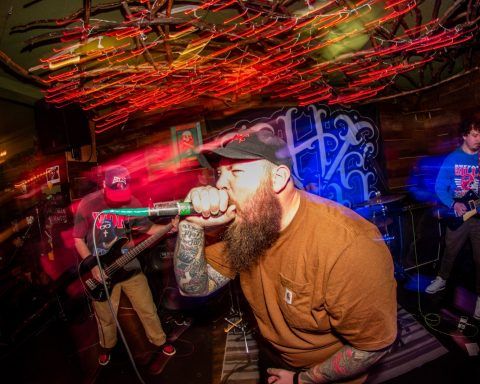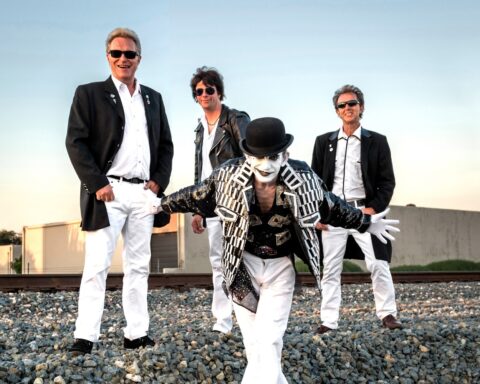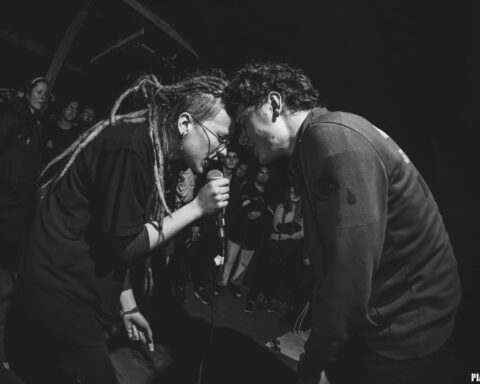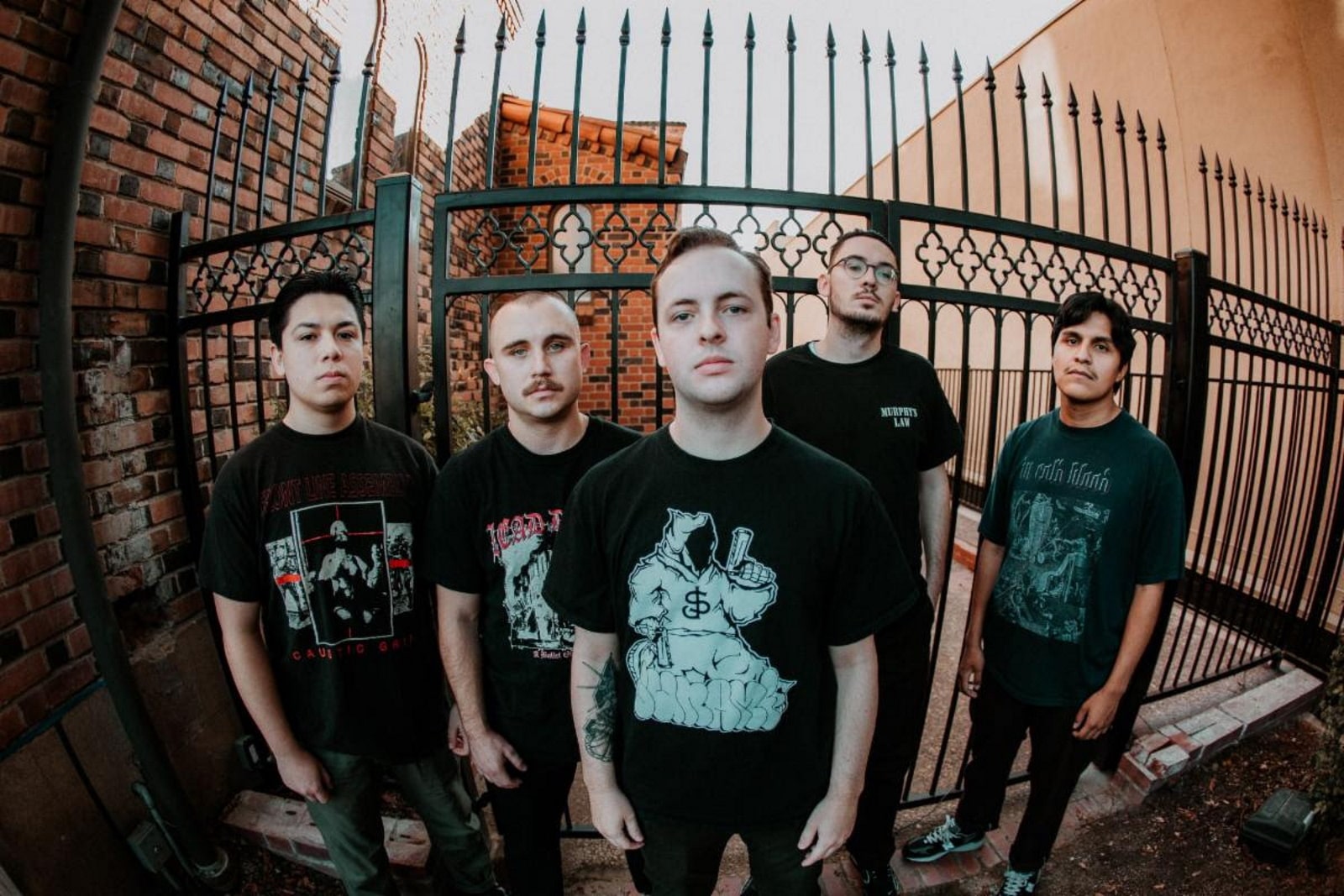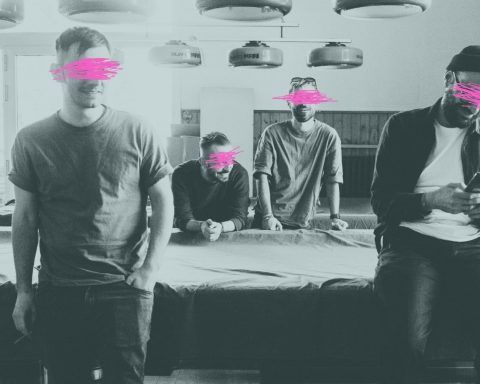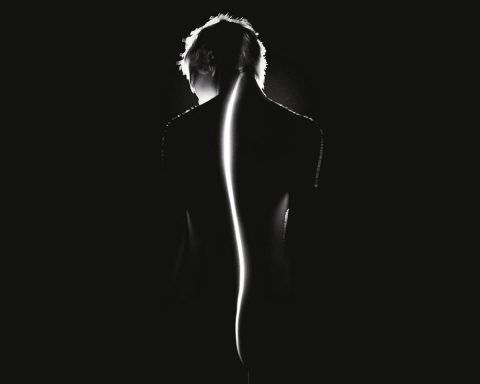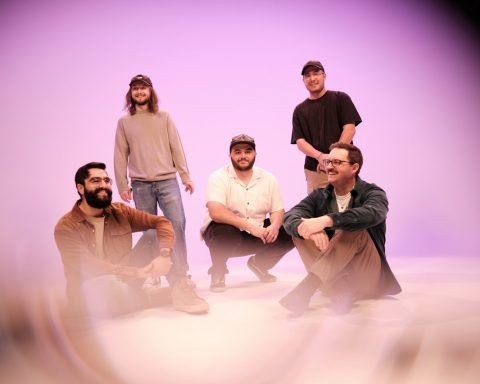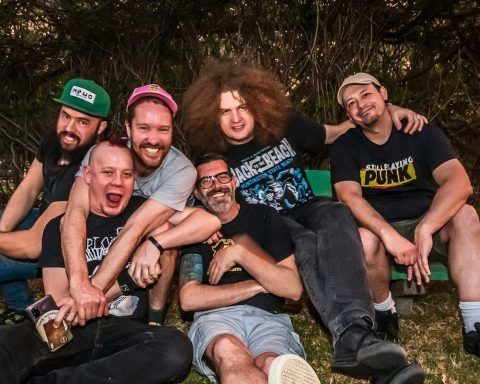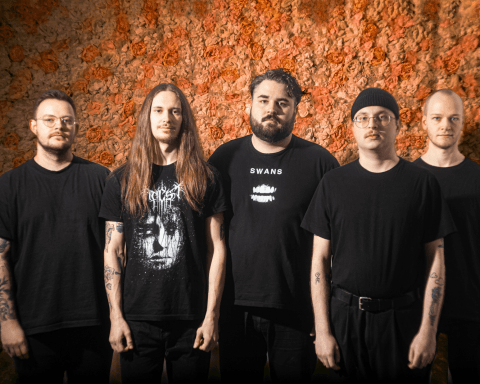A little over 3,5 years since our record premiere here on IDIOTEQ, we’re honored to welcome back DREAMWELL, our friends from Providence, Rhode Island, and give you an insightful feature on their new post hardcore masterpiece “Modern Grotesque“, inspired by a plethora of different moods and leaving a mark at the peak of their melodramatic powers. The band sat down with us to give us their full track by track commentary, a special list of records that inspired the new LP, and their favorite local bands worth a solid check!
Since 2016, Dreamwell has gathered every weekend at a farmhouse outside of Pdrovidence, RI to play their unique blend of screamo. Over the years they have gigged up and down the Northeastern US with bands including Birds in Row, Shizune, Portrayal of Guilt, Take One Car, Listener, ‘68, and Struckout.
After almost four years in the making, their second LP, Modern Grotesque unleashes 10 tracks that are both chaotic and dissonant, but also melodic, atmospheric, and emotive. Fighting through member changes, injuries, personal change, and a pandemic, both pain and growth can be heard throughout. Inspired by the characters of Flannery O’Connor, the lyrical themes on Modern Grotesque explore moments of pain, suffering and sorrow which immediately precede great change, and characters who are forced to reckon with what they are so that they might become someone stronger.
Of their second single, Sayaka, Brooklyn Vegan said ‘The song incorporates throat-shredding metallic post-hardcore, climactic post-rock, La Dispute-esque talk-singing, and more, and Dreamwell fuse it all together seamlessly, breathing new life into the genre in the process’. With Modern Grotesque, Dreamwell seeks to both pay tribute to the greats and to expand upon what a screamo band can be.
The band is: Keziah Staska – Vocals, lyrics, Ryan Couitt – Guitars, additional vocals, Aki McCullough – Guitars, additional vocals, Justin Soares – Bass, Anthony Montalbano – Drums
Favorite Local Bands, by DREAMWELL:
We’ve been playing in the New England scene as a band since 2016, and as individuals for even longer than that. Here, we wanted to take some time to highlight some of the incredible current bands we have gotten to see and share stage time with. Ryan, Aki and KZ each have picked a couple bands to gush about below. Also, for the sake of anyone not from New England, understand that here “local” essentially encompasses four different states.
Ryan: Emoviolence also from Providence, RI that started as Tall Ships Set Sail. In the last year they were actually in need of a new bassist so Justin tried out and was gonna do it but had to make the decision to move to Iowa for school. So I slid in and snagged that spot as Amitié bassist and we got some things in the works, shout out Illuminate My Heart Records.
Aki: Fun fact, Dreamwell would not exist without Anyone Anyway. They’re the ones that introduced Justin and Anthony to Ryan and our old vocalist after their old bands broke up. If you’re a fan of post-hardcore in the vein of Underoath and Circa Survive you’ll def dig them. They’ve been staples in the New England scene for years and at this point their live shows are infamous. In one moment of particular infamy, they played after us at a basement show up in Lowell, and in the last song of their set Justin and their vocalist Nick accidentally headbutted. Justin walked out covered in blood and had to get his eyebrow stitched up. Nick was super apologetic because he’s one of the best people but I think Justin not so secretly enjoyed the spectacle of it all.
Ryan: The homies have always welcomed us with open arms into the scene since day one. These guys are truly crazy talented and just overall sweethearts. One night we were both on a sold out show with ‘68 in Cambridge and during soundcheck Justins amp blew up. Smoke and everything. So while his life crumbled in the aftermath of this vintage amp death A|O saved the night and let us use their rig. We still broke a string later on.
Aki: Our fave bois from rural Connecticut, and one of the most talented bands in the scene. They play some heavier screamo taking influence from Modern Life is War and Birds in Row. We’ve gotten to play some really memorable shows with them in the last few years, including opening for State Faults together at a little space in Providence. Another highlight was them joining us for a couple shows on a weekender, including one near Burlington, Vermont. It was mid December and an absolute tundra out and we were playing in a basement. Lossbearer (a VT hardcore band also worth checking out) managed to bring us all out of mosh retirement. One of our last shows before covid hit so its a memory we hold dear.
Ryan: The cutest lil bunch of nuggets slightly northish of Boston are a culmination of our favorite locals bands Bystander and A Tiny Spider. These two bands birthed this beautiful creature. We love Doug. I actually almost played bass for them too but I just couldn’t make the almost 2 hour one way drive for praccy. We immediately knew they were gonna do big things. They do the shoegazey sad thing but better than the rest.
Aki: Another local scramz favorite whose sound I am absolutely envious of, and some of our favorite people in the scene too. Their sound is in the older school screamo vein, but polished and tight. We’ve had some fun gigs with them, including one of the most memorable shows we’ve ever played, a basement gig in Allston with Shizune and Lytic, which was also their album release show. The amount of screamo legends per square foot in that room will not be topped anytime soon.
KZ: Sexless Marriage is a newly formed powerviolence group out of the South Shore/Boston area who just put out a self titled ripper a little while ago on Knighted Throne records. Greg Weeks (The Red Chord, Labor Hex) and Mike Morowitz (Weak Flesh, Wet Lungs, The Roller, that one Daughters song) are my good friends and they’ve both been really supportive and excited, whether feigned or genuine, about our record. Hoping to rip some gigs with them in the version of the future that has gigs, among other things.
Aki: Gonna plug my roommate’s band but really they deserve to be on here too. Some exciting and fresh stoner doom/sludge that mixes some of the expected influences like Sleep with some more atmospheric influences and moments of hardcore. Alex has some of the best tone and best rigs out there and her Instagram/Tik Tok accounts are definitely worth checking out for her guitar videos. Their drummer guy is not bad either. Hyped to get to record their debut album soon, it’s going to be enormous.
KZ: Not technically a local band anymore since the members live in various states now, but Cerce is the greatest hardcore band of all time, was integral to the Boston scene during their first reign, and was transformative for me as a performer. I’ve learned so much from watching Becca perform and listening to her voice, and I’ve learned so much directly from Pat as well. Great people, unstoppable band.
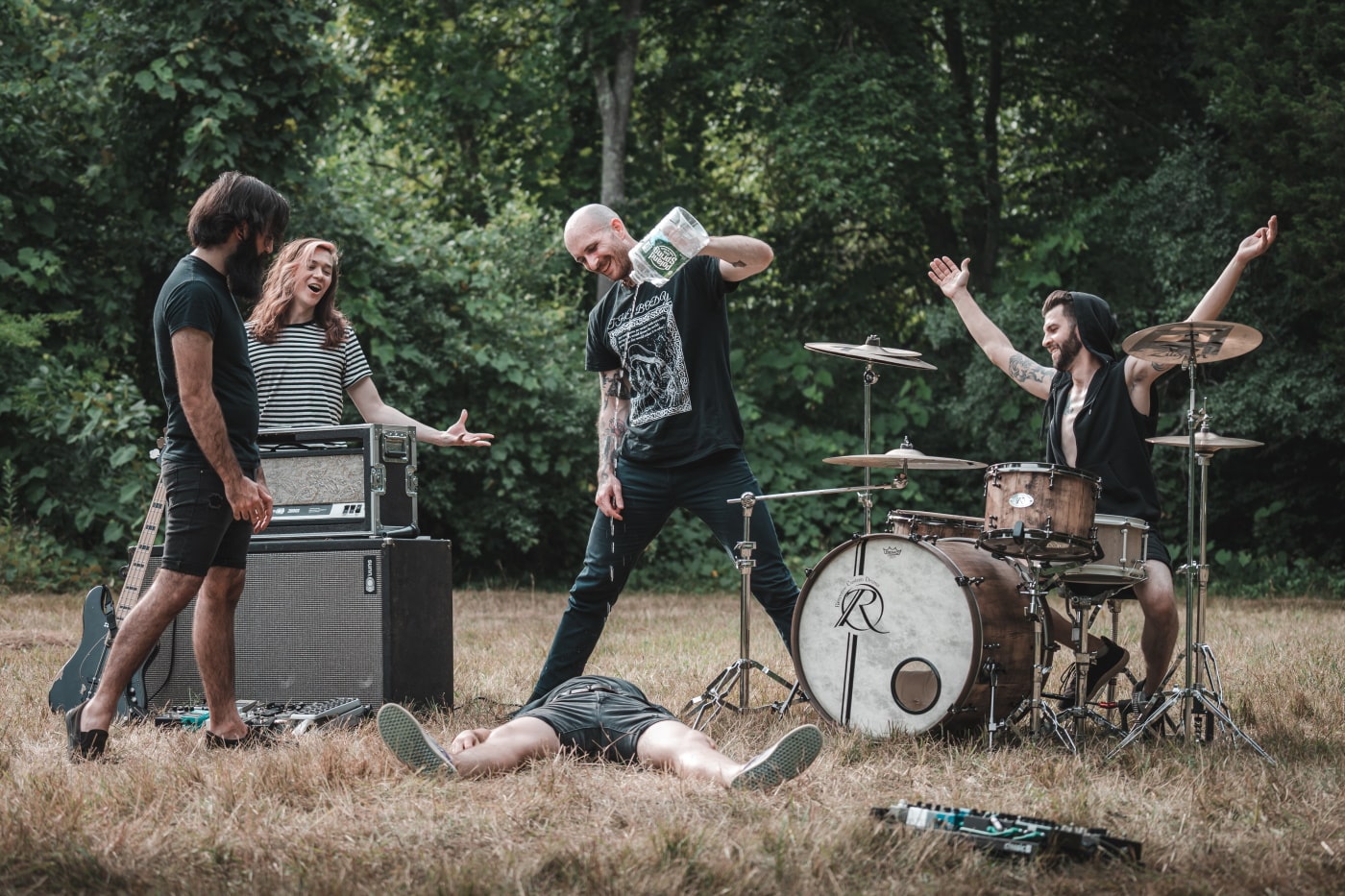
Continued below…
Albums That Shaped “Modern Grotesque”
Keziah:
1) You Won’t Get What You Want – Daughters
This is one of my favorite albums of all time. The dark and somewhat gothic undertones really stood out to me here, and I really started listening to it right around when I first read “A Good Man is Hard to Find” and the two just clicked for me and told me that I wanted to exist in this headspace for a while. More than anywhere on the record, I think you can really hear the influence on the title track, “Modern Grotesque”. I wrote in that heavily narrative style because of “Ocean Song”. It’s obviously a very different story, but I don’t know if I would have taken that approach if I didn’t listen to that song. Alexis’ voice is a clear inspiration for the dramatic talk-sung part in the middle. So much so that I asked him to do it instead of me because I knew I was going so strongly in that direction, but he declined. I would love nothing more than to work with him in some capacity someday. He’s a massive influence on me in general as a vocalist and a writer.
2) Pastel Blues – Nina Simone
In general I was really deep in a Nina Simone spiral at the start of this record, but I give the nod to Pastel Blues specifically because it has “Sinnerman” on it and that song is huge for me. I’ve used weird Christian themes in my writing for a long time, not because I’m religious but because, to quote Hideaki Anno on the same topic, “it looks cool”. But the narrative of “Sinnerman”, this desperate sinner pleading to a God who has grown indifferent, with the brutal images of boiling, bleeding rivers and seas, put the idea of religious writing into a new frame for me. I wanted to get real dark with it, and write about characters who had a strained relationship with God instead of characters who outright reject God. “Sinnerman” was a big influence on “Modern Grotesque” and “You Dream’t of Me. I Dream’t of a Mountain of Salt”. One thing that makes Nina Simone stand out among other vocalists of her time, too, was how she wasn’t afraid to sound a little weird sometimes to really add an extra layer of girt and emotion to her voice. She makes some unconventional vocal decisions on “Be My Husband”, uses what you could call a little too much vibrato on “Nobody Knows You When You’re Down and Out”, stuff like that. I love that willingness to be imperfect, and maybe even a little uncomfortable, to really make a passage feel weightier. I would call the end of “Sisyphean Happiness” my attempt to capture some of that.
3) All Hail West Texas – The Mountain Goats
You can assume this is true of anything I’ve ever written. Every time I write a song, it’s me just hoping that someday I’ll write a lyric half as fucking devastating as “the deathless love we swore to protect with our bodies is stumbling across its bleak ending.” I know I’ll never do it, but it’s the carrot on the stick that keeps me moving. But really, John’s semi-narrative style, and the way his writing seems simple on the surface but is really dense is really important for me. My favorite trick of his is to write relatively simple and accessible stuff that’s fairly unassuming, and then Trojan horse an absolutely monstrous lyric when you least expect it. That contrast makes it hit so much harder. That’s the effect I’m going for in sections of our record, like the sudden switch in “Sayaka” when I drop my voice and say “if I cannot feel, then I cannot be stopped”, or the switch from the extremely simple verse to “there’s something to be said about the way we learn to die” in “Sisyphean Happiness”. The line “weeping like a mute stone” in “Sayaka” is an intentional homage to the song “Balance” when he says “trying to squeeze tears out of mute stones” (which in itself is a reference to Cicero, so I’m not just stealing from John).
Aki:
1) Suis la Lune – Riala
In my opinion this is the immaculate screamo album. Between the tone, riffing style, and bending the shit out of everything, I was kind of worried the influence from this album in my guitar playing was a little on the nose at times. A prime example of an “Oops all bangers!” album. Each song lodges itself in your head, each guitar part flows seamlessly into the next and from song to song. The guitars are such a finely woven entity, sometimes they’re lead/rhythm, sometimes a melody and countermelody, but they’re always in the right place at the right time, and more often than not, your perception fuses them into a single entity. Not even sure what else I can write about this one without writing about everything because it really just is that good.
2) Bosse-de-nage – All Fours
Metal was my first musical love and for many years the only genre I really listened to. In the past couple years especially I’ve been big on variations of the black metal sound such as atmospheric black metal and blackgaze. Honestly I’m a huge Deafheaven fangirl and they’ve maybe influenced me more than anything but I don’t think there needs to be yet another Deafheaven blog piece. All Fours is just as high up there with my favorite albums of all time, and specifically showed me how to seamlessly blend the worlds of screamo and black metal. There really isn’t a single parallel minor third black metal chord to be found on this album, its almost entirely old school screamo and Slint with blasting and a much darker atmosphere. Oftentimes in heavy music “atmosphere” is synonymous with lots of reverb, but not so here. The guitars are almost bone dry, even when they are sparse, leaving an uncomfortable negative space between notes that feels like fumbling in the dark. The drums feel intimate, as if you were watching them being played in a small concrete room. On Modern, my guitar is more often reverb drenched than not, but the exploration of other means of creating atmosphere on this album still stuck with me.
3) Dependence – Remembering Everything
This album seems to have fallen a bit under the radar but I really latched onto the guitar playing around the time we started writing for Modern. It’s a dynamic and at times intense album, but the guitars are almost entirely clean, or only slightly overdriven. The clean tone on this album and Riala were pretty much the main inspiration for my tone and riffing style on Modern Grotesque, where I kept things clean 80% of the time. Blending these influences with Ryan’s crunchier tone ended up creating a really unique sound for us. There’s some washy and dreamy outros on this album too, such as on “That Was the First Day It Rained…” and “What it Takes to Move Forward”. I’ve always been big on the art of composing intros/outros so that the album ebbs and flows. In particular, the transitions from A Crouching Tiger… to Plague Father, and The Lost Ballad… to Modern bear resemblance to the dreaminess of the transitions on this album.
Ryan:
1) AFI – Sing The Sorrow
I have been obsessed with this album ever since it first came out, it’s one of the rare albums I actually got to experience from the time it came out even though I was only 6 years old. My grandmother had gotten the cd for my brother one christmas and I borrowed it any time he wasn’t listening to it. I end up listening to tons of bands that only have one guitarist in them and being mostly a rhythm player I’ve found myself emulating their playing in mine. I play full chords a lot for this reason, so much depth gets added to parts when you play more than just a power chord. This album has so much raw emotion and feels almost cinematic. It’s my all time perfect album and there are many times where I honestly just tried to write a sequel to Sing the Sorrow and have my own version as Modern Grotesque.
2) Coheed and Cambria – The Second Stage Turbine Blade
This one basically has the same story as far as how I found it in my youth. This album actually blew my mind every time I listened to it for the first 20 times. Never before had I listened to an album and found something new to focus on each time, all the instruments were doing their own thing but all together it just created something massive. I took a lot from that for Modern Grotesque, there’s a handful of parts thrown across the album where me, Aki, and Justin are all playing completely different parts/melodies but somehow we layer them just right to where it works. The middle part of ”…Mountain of salt” breaks down into this really intricate part where me and Aki almost skip through each others parts where I’m playing a flamenco pattern that feels like its a dotted pattern off from what she’s playing and I think that entire part and the one before just absolutely screams TSSTB. The entire vibe is extremely ”Time Consumer”.
Justin:
1) Glassjaw – Everything You Ever Wanted to Know About Silence
I don’t know that I would have gotten into heavy music without stumbling across Glassjaw while watching Ginger Snaps back in middle school. I heard it, was intrigued, tracked it down, and was hooked immediately. Their versatility in creating some of the most aggressive music that I’ve ever enjoyed, and combining it with softer passages of play that focus more on building beautiful instrumentation is a balance I’ve idolized ever since. They accomplished it all while maintaining originality and technicality on every instrument and I’ve always wanted to emulate that. From the perspective of a bassist, it’s very easy to write safe (boring) riffs, but growing up with Glassjaw bass riffs always made me want to challenge myself to write bass parts that pushed my own ability, and matched the pace and technicality of the guitar parts (Aki and Ryan make that last part fun). A few songs, Sayaka, Lost Ballad, and Mountain (although there’s undoubtedly some ETID and Coheed influence on this one), capture that pretty concisely. Manuel Carrero’s tone is also the best Glassjaw bass tone, and that’s a hill I’ll die on.
2) Pianos Become the Teeth – The Lack Long After
Attempting to pick the most influential Pianos album is difficult. With Gift of the Giver and Houses We Die In on it, even the Saltwater EP is a contender. The Lack Long After wins out because it’s not only perfect, but, after my own experiences with family members having neurological diseases, it’s cathartic. When writing Modern Grotesque, we individually made so many adjustments and changes to our tone. Part of that was us as individuals wanting our respective instruments to sound a certain way, but also because we wanted our tones to be more complementary to one another’s. The way that the guitar and bass tone on this album complement each other so well, is something that I think we were all aware of and used as influence on some level.
3) Deftones – Adrenaline
I can’t write the bassline to Sayaka and not claim Deftones as an influence.
Continued below…
Track by track commentary:
What Does It Mean to Live in a Grotesquerie?
KZ: This was the last song written for the album and it was one of the hardest ones for me to actually conceptualize what I wanted to do. Lyrically, this essentially serves as a prologue for the rest of the album. The lyrics are all referential to the other songs, and it establishes a through-line that connects them all. Though I’m writing about disparate characters who are tackling specific issues, they are all a different part of the same whole. Each one of them is what I see as the “Modern Grotesque”, slivers of the trademark suffering of the modern world and the hope that it can be overcome. That’s the theme of the record. I love the writing of Flannery O’Connor and she, along with a lot of Southern Gothic writers, wrote these characters known as “grotesques”. They’re usually very odd, off putting, sometimes creepy or sinister, but that’s not really their purpose. They tend to represent negative aspects of their surrounding culture, and are meant to show how they can be changed. O’Connor wrote about how she was fascinated by the moments before a redemption arc, and how one cannot be redeemed until they fall. She wrote about the fall. I wanted to do something like that, but with broader and more universal themes to the modern cultural climate, especially in the internet age where regionality isn’t as important.
I recorded this one in a hallway at the studio, with the mic set up at the opposite end. I’m really loud, so I’ve always loved doing that.
Painting Myself a Darker Day
Aki: Not only is it the first song on the album, but the first song we wrote for the album. In early 2017, even before we recorded The Distance, I went through a period where I was recording dozens of riffs, one of which ended up being the chord progression for this one. Later, when we fleshed it out fully, we basically set out to write a Huge Album Opener, in the vein of “I’ll Be Damned” by Pianos Become the Teeth. Not every song was written with the full album in mind, but this one was always an opening track. It’s actually been in our set since 2018, so I think everyone in New England has heard it dozens of times by now.
KZ: Yeah it’s kind of funny, I’m actually the third vocalist to work on this song. I’ve heard pieces of the previous vocalists’ versions and it’s wild to hear how extremely different each person’s individual approach to the same song can be. I mostly let the drums in a song dictate what I’m doing, so I went for a more unrelenting-vocal-assault approach, but when Anthony’s drums get busier with all the fills, you can hear me fall back a bit to give his playing some space.
While this was the first song I wrote for the band, and thus was written before I had established the theme of the album, I think it still fits. This is one of the more autobiographical songs on the record, and was very much about the specific moment of time it was written in. I was balancing so much in my day to day life at the time, between work, a side job that required me to drive into the city early in the morning, school, the gym, and various creative endeavors. I was basically sleeping five hours a day and constantly working for the other nineteen. Not only was I straining myself, but I was straining my at-the-time relationship, too. When I got home from work, I wanted nothing more than to just lay in the dark in silence and not have to move or think. I had no energy to be social, and it meant that I wasn’t spending any personal time with my partner. The time that we did spend together, I was moody and irritable. I knew it was hurting her and I hated it, so this was me trying to own that and start working to overcome it. And that’s what this album is all about; overcoming the hardships of the modern world. I think this kind of fatigue is a very modern problem. People have always been busy, but the current generation of young adults has to work harder just to live than any other in recent history. I think we are all experiencing variations of this kind of fatigue and burden of responsibility within the working class.
I recorded this song in one unbroken take, except for the line “where I can get some sleep,” which I delivered with a little too much sass the first time.
Ryan: Yeah, I remember the first song we started working on after The Distance was this one. Aki brought it to practice one week and we just kept practicing it and I felt like it was already such a step up to be out of recording an album and just getting right back at writing, I immediately knew it would be a strong song to start with.
Justin: We were all so ready to move on and continue writing that we dove into this one so quick after recording our first release. It honestly channels Pianos Become the Teeth energy so much for me that until about six months ago I was still referring to it as Pianos.
Continued below…
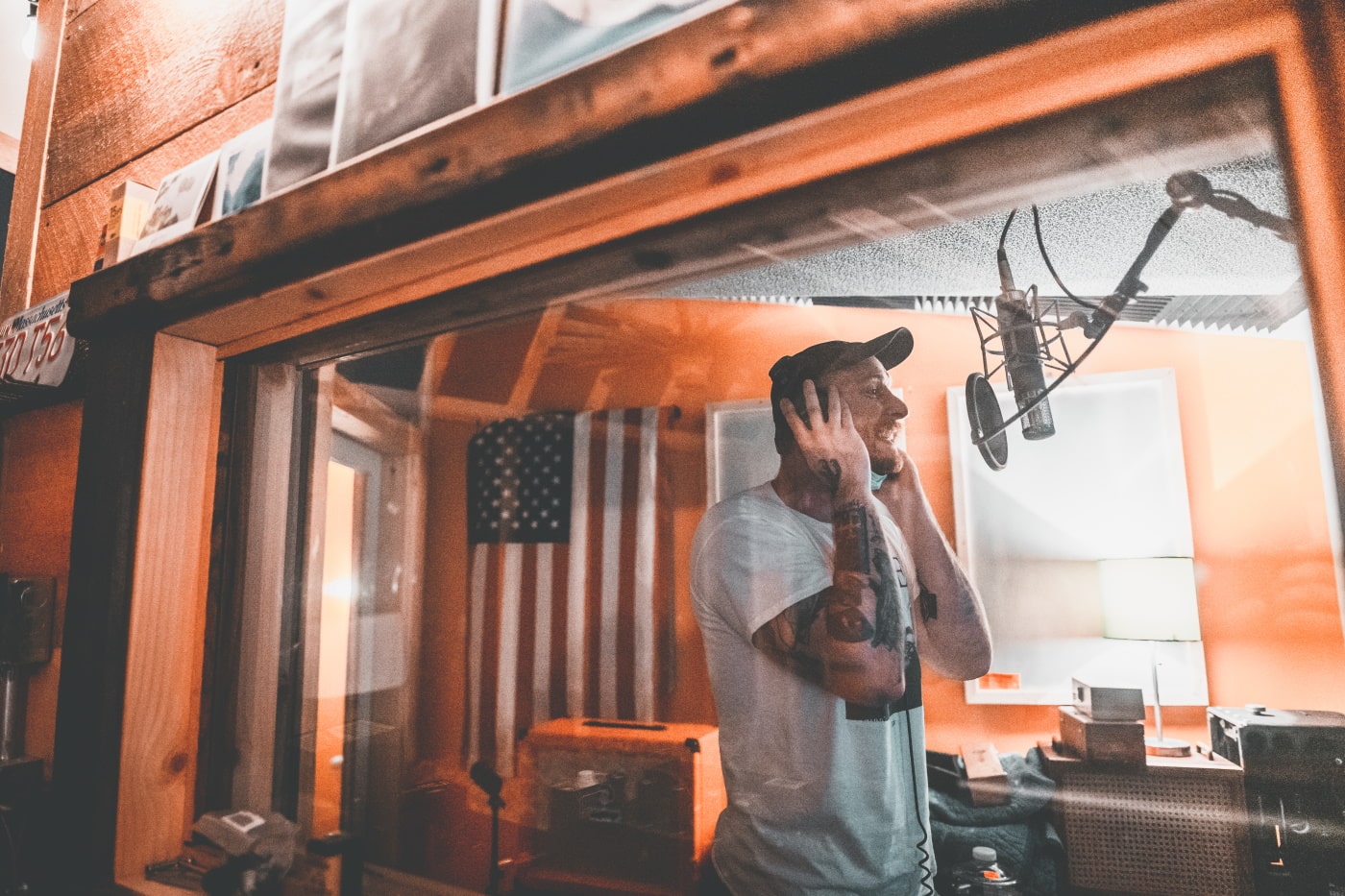
Sayaka
Aki: This is the first song that came out of the band just jamming together, as opposed to someone bringing a riff or song to practice to work on. I remember showing up late to practice (as I do) and hearing them playing the groove and insisting we had to do something with it. We really wanted to fit a bass riff Justin had written into the song, and the tempo change (in the bridge) was incredibly hard to work out but paid off. One of my favorite details is that I don’t touch the tap tempo on my delay for the entire song. But because of the tempo change in the bridge, the delay goes from a quarter note delay to dotted quarter delay. This song is also the beginning of our engineer, Ryan Stack, roasting us about our “juggalo shit” (using our pitch shift pedals on everything), which only encouraged us to put even more juggalo shit into our songs.
KZ: So, this song is about the character Sayaka Miki in the anime series Madoka Magica. Me and my friends each have a soul gem tattoo representing each of the main characters, and mine is Sayaka. I think she’s a really interesting character with such a tremendous arc, and I also think she’s a perfect study for the theme I’m exploring on this record. She is totally a modern Grotesque character, a young person constantly teetering on the verge of full existential panic and struggling to understand her worth in the world. So this song is my own poetic interpretation of her storyline within the series. I won’t go into full detail of how I worked her beats into my lyrics, I think if you know the show you might be able to work most of it out, and if you don’t it would be super boring to read. But I just want to highlight my favorite little lyric because I think it’s really sneaky – when I say “I wish you could hear his voice”, it’s referencing Sayaka using her wish so that Kyosuke could play violin (“his voice”) again. That should be enough of a key to decipher the rest of the references for potential fans of the show.
I recorded this in one unbroken take.
Ryan: This is absolutely one of those songs that just decides to exist. You show up to practice and for some reason everyone sets up and the first thing that comes out is the song. Almost exactly how the song starts is how it was written. Anthony started playing the groove, Justin joined in and then I just followed along, when we stopped it was just that total moment of “damn that was good, it has to be a song” and then Aki showed up to praccy.
Justin: This song came out of nowhere. We were just messing around and killing time until Aki showed up, but by the time that she got there we already had most of this song planned out. The only real challenge was the bridge, because we didn’t really have a riff for it. Somehow Anthony heard me messing around with the bass line that ultimately wound up there, and looped the same drum fill until I fleshed it out. Getting to make the squeals, you know the Juggalo shit, at the end is honestly a favorite part of the set for me.
A Crouching Tiger Waits for Prey That Never Comes
KZ: This is a song I had kicking around in my head for a while, but could never get a direction for it until I heard this instrumental. It’s about reflecting on old relationships and realizing that the two of you have become strangers again. It’s a weird feeling, that you could once be so intertwined with a person’s life, and later become nothing but a distant memory to one another. So this is a character who is occasionally haunted by the memory of a former lover, kept up at night wondering if they ever think about them too. But there’s a kind of pain that comes with remembering them, so our narrator hopes for the other’s sake that they don’t.
This was done in one unbroken take.
Ryan: Once upon a time before KZ joined, a vocalist tried to rewrite the entire bridge of this song. Fuck that guy.
KZ: Homie said it just didn’t make enough sense to sing anything over. Weird because I had no problem coming up with my part.
Anthony: The bridge of this song went through a few variations before settling on “fuck it” and giving into the vibe it wanted.
Continued below…
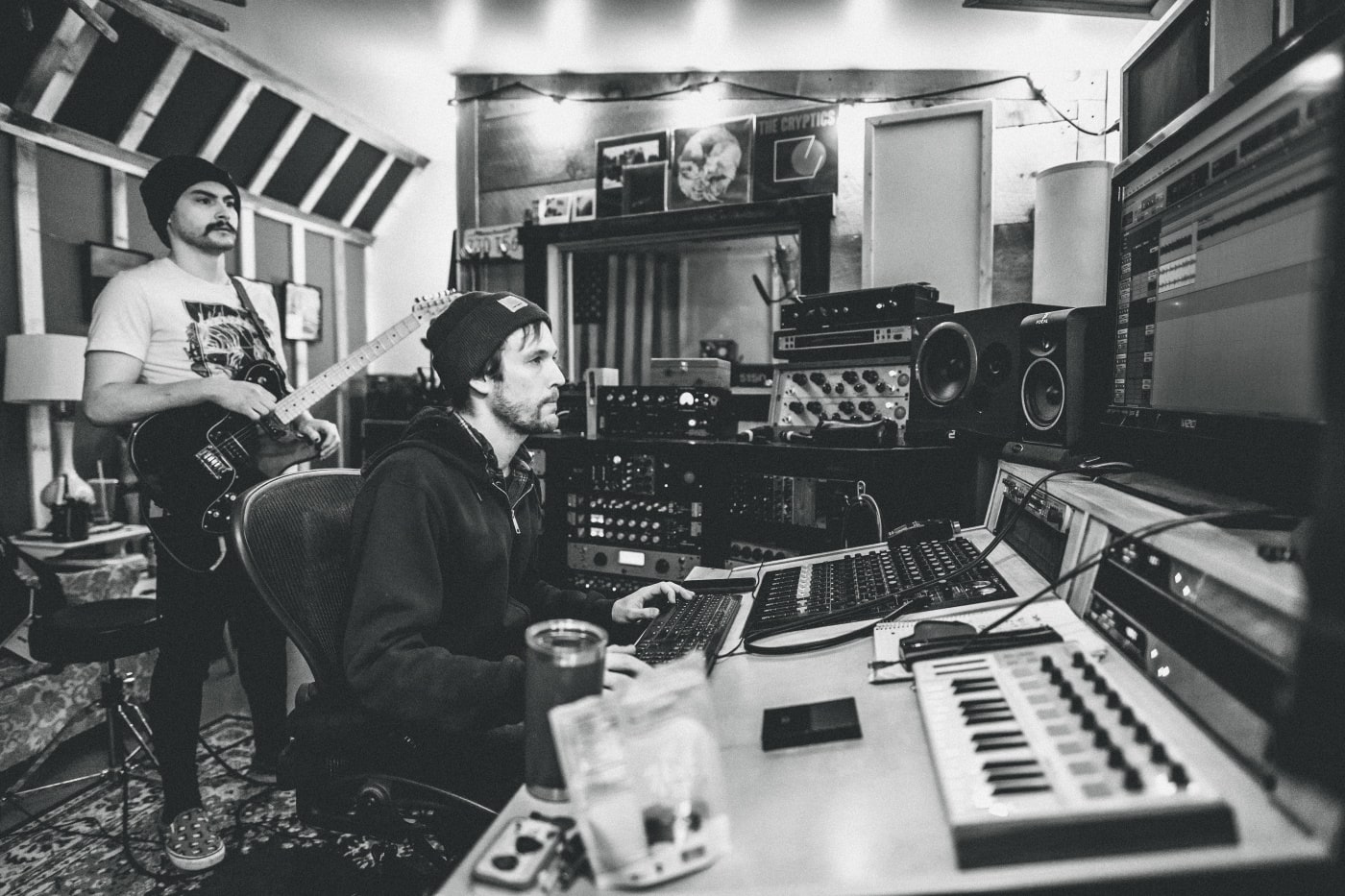
Plague Father; Vermin Son
KZ: This is definitely the most autobiographical song on the record. It’s about my severed relationship with my father. I grew up in a household dominated by manipulation and emotional abuse, and while only a fraction of it was directed specifically at me, just being around it for so long was more than enough to do some irreparable damage. So this is a song about abuse in three parts. 1) taking the horrifying step of being able to give what happened to you a name, to recognize it plainly and openly as abuse and stop hiding from it. 2) this fear of recognizing certain parts of my father in myself. This fear that someday those pieces of him might make me turn into what he once was. 3) overcoming it, and healing through ridding it all from my life. I have been told by so many people over the years that I am going to have to forgive him someday, which for anyone who has suffered abuse from a parent I just want to tell you is absolutely not fucking true, you owe nobody forgiveness and you shouldn’t let a single person guilt you into thinking otherwise. But the thing is that, for me, I do forgive him. I want nothing more than to believe he has changed. It’s entirely possible that he has. But none of that means he gets to be part of my life. Yeah, I forgive him now, but part of that forgiveness is only possible because I get to live a life without him. Forgiveness doesn’t cure me of PTSD. It doesn’t stop me from not being able to breathe when I see him. That’s what the ending is all about. So, Dad, if you happen to be reading this, there you go.
Ryan: Fun fact, while recording I guess my G string was oddly not intonating well enough and Stack wasn’t satisfied that the chord I was playing didn’t feel full enough that he actually had me put a capo on, both to intonate the bum note and also make a couple chords more full on the last guitar break before the last section of the song.
Justin: When we first started working on this one we thought it was going to be the slow ballad-y song on the album. Looking back we were pretty wrong.
You Dreamt of Me. I Dreamt of a Mountain of Salt
KZ: This is a song about queer revenge. It’s also a song about how conservative Christians have been using intentional misinterpretations of Bible passages to justify bigotry and homophobia. For the record, I’m not religious, but I do spend a lot of time thinking about Biblical stories and teachings. This was a fun one to write because the subject matter let me explore darker and weirder imagery. I wanted it to feel kind of biblical, so I started writing this story within a surreal apocalyptic type world. All of the lyrics in the beginning part of the song have this kind of allegorical dual purpose where they are all metaphors on one hand, and literal on the other. For example, “locusts have eaten the North Star” means, allegorically, that a swarm of people with ill intent have taken the guiding words of the Lord and eradicated their original meaning to better suit their hateful agenda. But it also means that when you picture the scenery I’m painting in your head, I want you to imagine a swarm of locusts eating a star because it’s fuckin’ weird and rad to me.
The story in question is that of Sodom, which contrary to homophobic belief, isn’t a story about gays being punished for existing, but a story about the responsibilities of hospitality and the sin of letting harm come to a guest in your home. The song is about the recognition that the systems of power that oppress our communities are made up, and the recognition that we have the power to revolt and fight back and force others to accept us, even if the fight hurts. As a band with two trans members, I feel this is the most important song on the record for me.
This was recorded in one unbroken take, except I think I might have had to redo a single repetition of “look back”, I can’t really remember.
Ryan: I don’t even know how many times we rewrote the second half of this song. At least 5. Then one practice we were sick of not having this song finished, KZwas in the hang section doing lyric shit or whatever and I was absolutely out of ideas for this song so I blurted out “why not just end it on a breakdown, fuck it” and KZ poked their head out in full agreement so there you go.
KZ: I was in the other room writing lyrics for “Lost Ballad”, and when they said they might just do a full on breakdown I literally launched out of my chair and sprinted into the room. They made the ending more complicated later and we were all frustrated so eventually I said “look, I already wrote lyrics for the first version. Scrap this. Play the breakdown. End.”
Justin: I think this song is infamously special to all of us. Yeah, we’re all insanely proud of our respective parts, but we all remember the ending saga. Once we decided on ending with a breakdown, it still took us a minute to figure out HOW to break down, which is hilarious in hindsight. Also, imagine having to record a song twice because you forgot to turn on your pre-amp…
Ryan: I also stood there and watched Justin track clean the whole time until he finally finished, and I said “hey you play clean the whole time in that song?” I guess he was under the impression Stack was gonna reamp him later but then Stack also responded with “wait why the fuck did you do that???”
The Vessel Bears My Face
KZ: No vocals here so there’s not much I can offer, but I can tell you about the little sample that’s buried in here. Summer of 2019 I went on a cross country road trip, and we had to drive from Minneapolis to Seattle in a straight shot. We were listening to a cool indie radio station in Minneapolis, and when we crossed over into North Dakota, it started to shift into a radio evangelism station. This guy was giving a sermon about something or other, about how harboring sin allows it to fester inside of you or something like that. I thought it was cool, like something you’d hear on an old Godspeed record, so I started recording it on my phone. The whole time the signal was kind of fighting and it was getting a little static interference, but there was this really cool moment where the preacher says “That’s why Paul said, listen to this…”, and the moment he says “listen to this”, it just gets entirely swallowed by static. You can start to hear another station playing music try to take over before it goes back to a heavily distorted preacher. I sent it to the band like “we gotta do some Godspeed shit with this”, so we did.
Ryan: I had this riff sitting on the band drive since literally 2017. Finally found daylight because we needed some pretty shit behind KZ’s sample. I actually recorded this in one take after relearning it in between other takes at the very end of a long session and I kinda had to convince Stack to just let me play this dumb riff until I thought it was long enough?
The Lost Ballad of Dominic Anneghi
Aki: There was definitely a bit of a tension while writing this album where we wanted to do more writing together as a band and less each of us writing their own songs and bringing them to practice. This started as one where I was annoying and wrote it on my own initially and demoed the parts out for every instrument. After the twinkly bridge, I had initially just wanted to recap the first half of the song, but once we played it at practice, everyone wanted to go in a different direction, which is how we got the last couple minutes of the song. I definitely had to learn in that moment to not be skeptical of an idea just because it wasn’t mine. Instead I went with it and hate-wrote the tapping riff. I’m glad we took it in the direction we did because the song is definitely better for it.
KZ: For some reason, this was the hardest song for me to write. It has what felt like a lot of shifts in dynamics between the parts, and when I first approached it, none of them felt like they were really playing to my strengths. I had to step real far outside my comfort zone to get this to a place where I was finally happy with it.
Lyrically, this song is about a character who thought they had overcome some of the flaws they had when they were younger, only to find them resurfacing. It’s about me questioning how much I’ve actually grown since I was a kid. I tell it through kind of a weird meta-story that you could absolutely not know unless you knew me really well back then. When I was in senior year of high school, I did National Novel Writing Month and I wrote this absolutely horrendous story about a sailor who, because I knew zero nuance at the time, was a carbon copy of me, and it was all about feeling distant and isolated from other people and not being able to connect with anyone. At the end, his ship is struck by lightning and he dies. That was supposed to be symbolic of me taking a step to better myself and grow up. But in this song, he comes back, taken out of the world of his story and into my life as represented in this song, and he’s still alive. An immortal weakness that I think I’ll always have. His face is made of glass, a mirror. He’s not just a part of me, but maybe just who I’m always going to be.
Justin: Out of maybe all of them, this song has the weirdest significance to me. It’s really a testament to us learning how to write with each other’s writing styles. Aki’s right, there was a ton of tension with how to proceed with the second half of the song. Anthony, Ryan, and I were playing before Aki got to practice, and ended up changing the ending quite a bit. When Aki finally got in and setup we showed it to her, and I remember being nervous about it because I didn’t want it to come off as us changing it because we hated it or something. So we get to the end and without missing a beat, whip out this insane riff. I’ll never forget the look on her face at that moment. I’ve never seen her so visibly angry before or since. To say she hate-wrote that riff is putting it lightly. Despite having this song written for a while, I was never content with my part during the bridge. The week I was scheduled to record bass parts for the album I had to cancel because of a death in my family. It was a weird time. I was grieving and felt like I was letting the band down by not being able to make it to the studio. I sort of channeled that and rewrote the entire bridge in between the wake and funeral.
Modern Grotesque
KZ: This is the most narrative-oriented song on the whole record. At its core, it’s about a street preacher who claims to have seen God and has lost his mind as a result, kind of Lovecraft style but without the racism. That’s what they say will happen in the Bible and in old English religious fiction. Like, God has this Angel called the Metatron who is “The Voice of God” and speaks on God’s behalf because to actually hear God’s voice would, like, make your brain melt or some shit. That’s why all those nazis melt in that Indiana Jones movie. The Seraphs, who are the angels who work directly alongside God, have extra wings so they can use them to hide their eyes because even they can’t look directly upon God’s face. So I was playing off that. He hears trumpets following him in the distance everywhere he goes and thinks it’s angels coming to kill him, he paints his eyelids black because he thinks it will make it even darker when he closes his eyes so he can never see the face of God again. He has a twisted relationship with God that started as praise and devolved into primal fear, worship out of fear for what might happen if he doesn’t. This is all allegorical for capitalism. People have become so conditioned to believe that it’s normal to absolutely work themselves to the bone just to survive, all so the elite can get richer and richer while they continue to suffer. People praise the “hustle” of billionaires who had parents invest millions of dollars into their “business that started in their garage” or whatever and think that they just need to grind until they end up like that, when the reality is that without a divine stroke of luck, they simply do not have access to that road without generational wealth. People have become chained to capitalism for no other reason than they think it’s the only way. So that’s why this song got the honor of title track, because of all of the grotesque characters I’ve written here, this is the most classically grotesque in the sort of Southern Gothic tradition of really warped religious ties, and it deals with the most modern issue of extreme poverty and people living on the edge of a much needed violent class revolution. General strike.
This was done in one take, except for a single repetition of the word “hills” which I overdubbed.
Continued below…
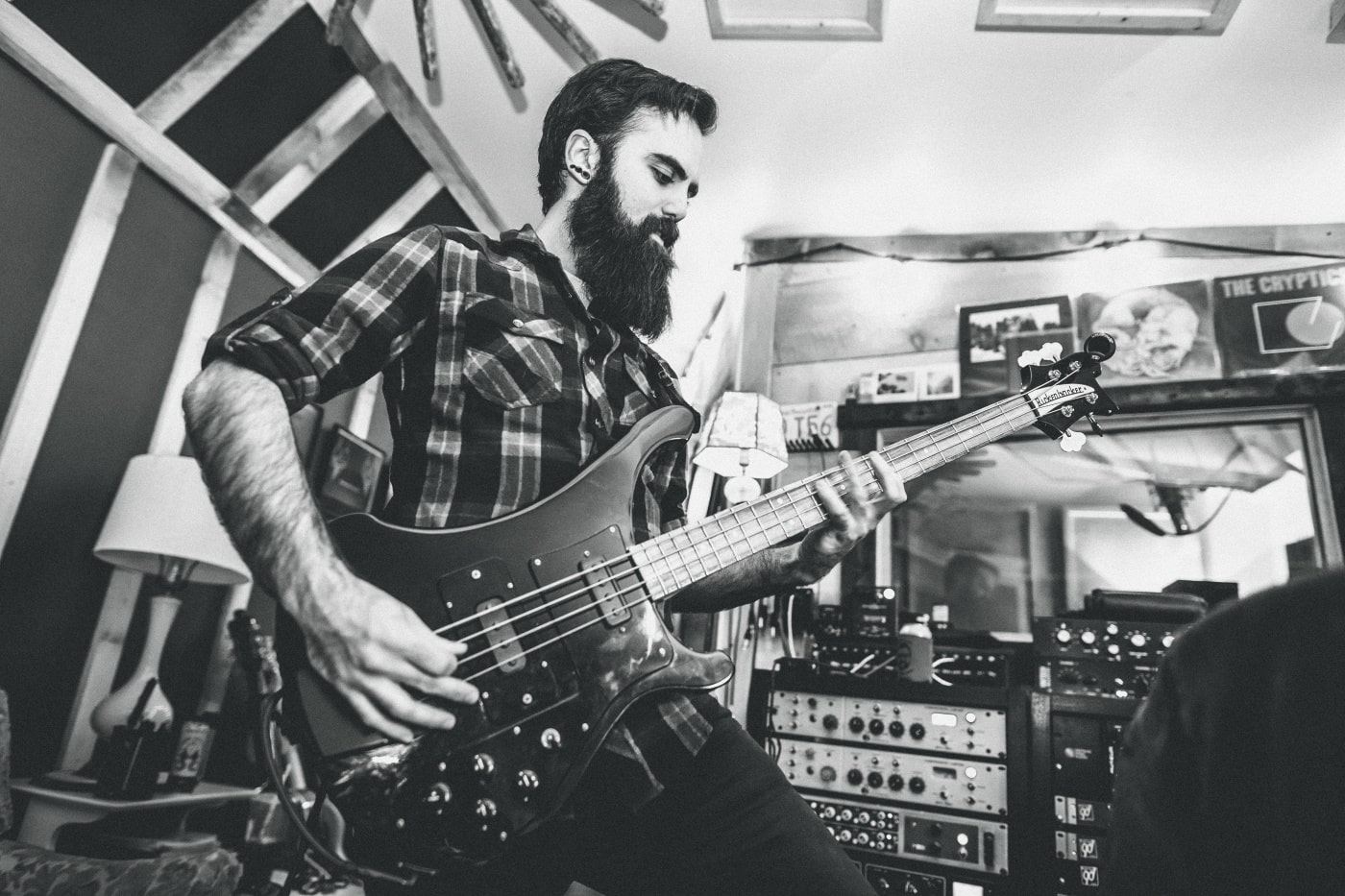
Aki: By the time we were supposed to track my guitar parts, we were deep into quarantine and had to cancel in-person recording at the studio. I recorded all my parts alone at my home studio in early April 2020. I was missing the encouragement and focus of being in the studio and although the first day went smoothly, by the second day I was working on this song I just had my own self loathing rattling around my head. I remember that day being one of my last “rock bottoms” before I decided to transition. KZ has summarized the lyrical themes for the album as “explor(ing) moments of pain, suffering and sorrow which immediately precede great change”. We never really discussed what we wanted the album to be about as a group, but it’s wild how much the creation of the album itself became part of that transformation process. Anyway, the suffering I experienced recording this song was probably karma for the suffering I inflicted by shitting out a 7 minute song with 100 different parts and making everyone learn it.
Sisyphean Happiness
KZ: This song is the epilogue, and it’s kind of written for all the characters. Most of the characters, as is the tradition for most Southern grotesque fiction and especially that of Flannery O’Connor, are only presented during their downfall, and their story ends just before they have the chance to take their first step of their redemption arc. Some end with a feeling of hope, and others don’t. But this song is kind of the final note of hope for all of them, and all of us as a result. It’s kind of hard to express what I was thinking when I wrote it, but more or less this song is me saying that we spend too much of our life worrying about the fact that we are going to die. In a lot of ways, death is the ultimate redemption. We can make all the mistakes and missteps in our lives that we want. We can miss opportunities and we can spend time being consumed by our weaknesses, but at the end of the line, death nullifies all of it. It makes it so that none of it matters. And since death is an unavoidable guarantee, that means that none of it matters right now, either. We know it’s going to be erased, so just pick up the pieces and move on. Like, maybe the next step I take will be a mistake too, and if it is, it does not matter. We’re all Sisyphus rolling a stupid boulder up a mountain and every time we fuck up, it goes back down, but it doesn’t matter, because his Boulder is going to go back down no matter what, and he’ll start over. So we might as well just start pushing again. There’s a lot of philosophy that proposes that life and death are a cycle, and that while the individual “I” will never exist again after “I” die, the energy that animates my shell will go somewhere, and bounce around the cosmos, and eventually find its way into another shell, and in that way, we are truly redeemed because then we get to have a whole new existence, one where the burdens of the current “I” are completely erased. Alan Watts said something to the effect of “there are two statements that mean the same thing: I die and am reincarnated as a baby, and I die and a baby is born”. So we might as well fuck up all we want in this life and start fresh in a hundred years or whatever.
This was done in one take.
Continued below…
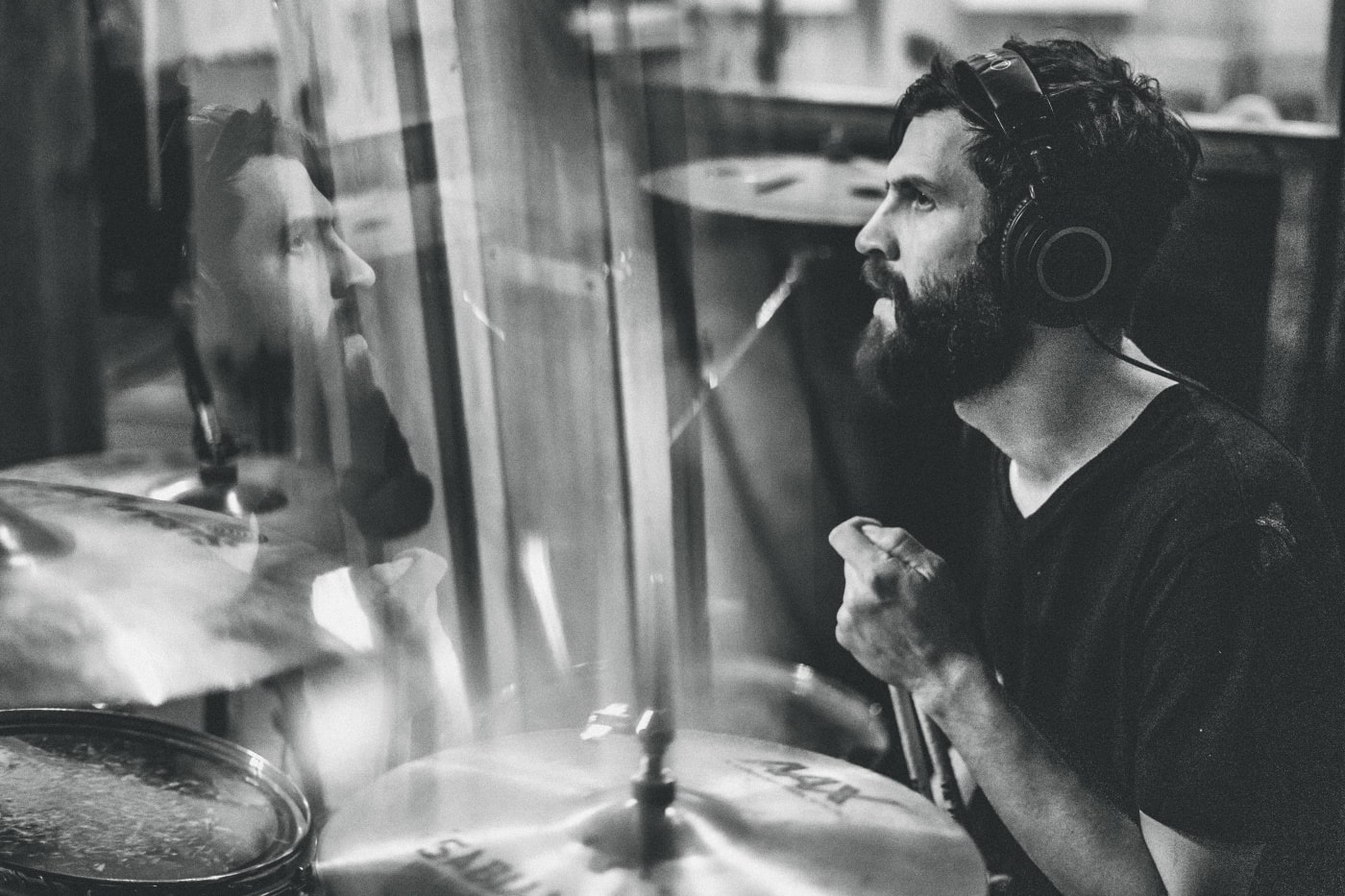
Anthony: Fun fact, this song is exhausting live on drums. It’s usually the last song in our set and I’m usually gassed at that point. There’s a lot of constant rolls without a break so it’s a bit taxing.
Justin: Even though we’ve played music together for years Anthony and I never wrote a heavy drum and bass outro. After we wrote this he looked at me and said something along the lines of “we finally did it!” Every time we’ve played it since I immediately think of how much time and effort we’ve put into playing together.



